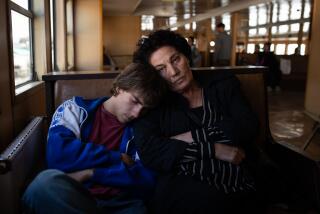Georgians, Beset by Fear and Chaos, Seek Respite--and Deals--in Turkey
- Share via
SARP, Turkey — Their new year overshadowed by the death throes of the Soviet empire, thousands of Georgians are streaming through winter mud into Turkey in search of goods and dollars as buffers against the chaos overwhelming their newly independent republic. They tell of hunger and a chilling breakdown of law and order.
Turkish officials in this remote border post on the Black Sea say 3,000 to 4,000 “suitcase traders” are now crossing the border each day.
Most are Georgians. They bring family treasures or manufactured goods of doubtful provenance to sell for dollars that will go a long way back home, where uncertainty and high inflation reign.
But many say they are afraid to go back. Roving bands of armed men and old-fashioned highway robbers stalk the countryside even as, in the capital, Tbilisi, rival factions fight for political control, they say. Turkish and Caucasian travelers report frequent holdups by bandits along the twisting mountain roads both along the coast and toward the capital.
“My father went to visit relatives in Tbilisi, and he lost everything,” said Adnan Ayten, a Muslim native of Sarp. “Nowadays everybody has a gun over there. Even taxi drivers take them out from under the dashboard and rob you.”
“The people in the bus behind us were stripped of everything in the Caucasus Mountains between Tbilisi and the sea,” said one weary traveler on a bus from Baku.
One Turkish truck driver told of having his leather jacket stripped off his back at a roadblock manned by tense local gunmen apparently loyal to no particular group in the fractured spectrum of Georgian politics.
Many of the traders say they support President Zviad Gamsakhurdia, who clings to power after a week of fighting in the capital. The embattled president was elected by a landslide in May, but rebels accusing him of dictatorial tendencies are seeking to overthrow him.
Politics preoccupies the Georgian travelers, but it is economics that engrosses them.
“I bought a video camera for $1,250. Is Panasonic a good brand? Have you heard of it?” asked Jengiz Chanturia, a Georgian trader heading back to the town of Batumi, just over the border.
Contradiction sloshes with commerce in the rain at Sarp, whose heavily guarded border post was closed for nearly half a century when Turkey, a member of the North Atlantic Treaty Organization, confronted the Warsaw Pact.
Across the fence, Georgia is now nominally independent, but a border tentatively opened in 1988 is still closely guarded by no-nonsense troops of the old Soviet army. They disdainfully marshal tangles of trucks, cars and buses backed up for three miles behind the electric fences and tall watchtowers.
Chanturia, the video camera buyer, is an old hand at the trading game, but he has the familiar look of the provincial ex-Soviet citizen this New Year: rough, thick, ill-fitting clothes, a shapeless hat, unwashed hair and a sallow complexion.
In Sarp, Chanturia and his Armenian friend Edward, who pridefully clutched a carefully wrapped Turkish chandelier, spent the last of their money on 10 loaves of bread at a cost of $2--perhaps a third of a typical monthly salary back in Georgia.
“We can hardly find bread at all. Life is very difficult indeed,” Chanturia complained.
The Georgians, though, like the peoples of the other former Soviet republics, seem determined to spread their wings.
In the past year, cross-border trade has suddenly bloomed into a major business in this once neglected corner of the country.
In the northeastern Turkish city of Trabzon, a mile-long market has stalls offering any kind of Soviet product imaginable, from tea sets to machine tools. Such “Russian bazaars” now exist in towns all the way to Istanbul, 600 miles to the east.
“In the last few months they have even started coming from Byelorussia (now Belarus) and Latvia,” said Ferhat, a Turkish plainclothes police officer who has learned Russian in the last year to help supervise the burgeoning customs area at Sarp.
The travelers, many of them women, boast that the resale of dollars, clothes or electronic goods bought in Turkey will keep them for months in their home republics. At Trabzon, the proliferation of shop signs in Georgian shows that the interest is mutual.
“The whole of the town is now turned toward trade with these people. Shop displays are based around it, goods are made to the (low) quality that suits their pocket,” said Rifat Guney, manager of Sarptur, a Trabzon travel agency now arranging excursions for Turks into the former Soviet Union.
A good chunk of the trade, Turks in Trabzon whisper, is a Black Sea version of sex tourism, matching dollar-hungry women from the ex-Soviet republics to men from conservative Turkey, where women are expected to remain virgins until marriage.
Georgia and the other hard-pressed republics are eager to please.
“There’s nothing that can’t be bought,” said Ahmed Can, a Turkish businessman. “Considering the food shortages, I was a bit shocked when I offered to pay cash to a Georgian fish factory for animal feed and they immediately stopped their fish production for humans to manufacture it.”
More to Read
Sign up for Essential California
The most important California stories and recommendations in your inbox every morning.
You may occasionally receive promotional content from the Los Angeles Times.










